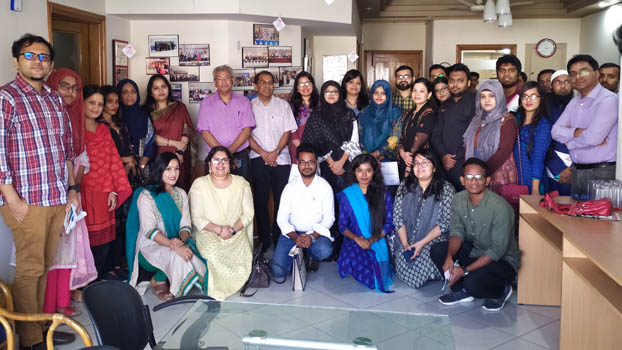BD economy has strong base
Speakers observe at a workshop

BP Report
Speakers at a workshop said that Bangladesh economy has a strong base and it massively needs resource allocation for attaining Sustainable Development Goals (SDGs) by utilizing the big budget.
The country’s progress in millennium development goals (MDGs) was exemplary but it needs to make a huge jump to achieve the SDGs. Within 2030, it needs to achieve a Tax-GDP ratio of 30 percent, they mentioned.
They were speaking at a workshop on “Three Pillars of Sustainable Development Goals” in Dhaka Saturday evening. The workshop started with the introduction of the participants and opening remarks from Dr. Selim Raihan, Professor of Economics, University of Dhaka and Executive Director, SANEM.
Dr. Selim Raihan mentioned that there is a knowledge gap regarding SDGs in every sphere, including the academic sphere. “It does not necessarily imply that we will be able to achieve something good in terms of SDGs just because we did well in terms of MDGs. SDGs are a whole other business. Our purpose is to assemble the academicians and policy makers so that we all can deal with it better”, he said.
Dr. Sayema Haque Bidisha, Research Director, SANEM presented a paper on “Three Pillars of SDGs”. She focused on the social issues related to the SDGs which encompasses five SDGs and said, “The basic difference between SDGs and MDGs is that the SDGs emphasized more on climate issues, gender equality, peace, justice and other such stuff that were often neglected in other goals. SDGs are all about setting our priorities right.”
“The health and nutrition issues are really important in the recent context of Bangladesh. If we can meet one goal, it can affect the possibility of meeting the other goals positively”, she also said. “The underprivileged regions should be given more priority.” “The health sector needs massive amounts of public investments, which is significantly missing in our country. The allocated portion for the health sector in our budget is around only 1 percent, whereas it should be around 5 percent. Only increasing the budgetary expenditure is not enough, quality of service delivery has to be ensured.”
She talked about SDG 2 (Zero Hunger) which focuses on eradicating hunger and ensuring nutrition. She focused on the fact that mitigating hunger has been successful but ensuring nutrition has been a challenge. Bangladesh has fallen behind in terms of nourishment. In South Asia, only Pakistan is performing poorly than us. The country also faces problems of stunting. Bangladesh must focus on these issues.
The financing required to meet these SDGs must come from the public sector. For Bangladesh, this remains a massive challenge due to budgetary constraints.
Bangladesh’s health care investment needs to be at least 5 percent of GDP. The quality of service in the private facilities also needs to be ensured.
Mentioning that SDG 4 focuses on quality of education, she said, the vocational and ICT education needs to be improved in Bangladesh. She focused on the quality of teaching as well. Linkage between industry and education sector is also vital for a country like Bangladesh in order to mitigate the skill gap.
According to Dr. Bidisha. “Quality of curriculum is as important as the quality of teaching. The linkage between the industry and the education sector is weak, and this is something we need to be working on. In terms of gender equality, it is important to establish the rights of women on any sort of resource important for their flourishment. And the state has to bear the responsibility for that. It is their role to ensure better management. Another important aspect would be ensuring women leadership and the recognition of unpaid domestic labour. Also, reducing child marriage and violence against women should be one of the crucial mandates.”, she said.
Dr. Bidisha recommended that maintaining a proper database related to SDGs is integral to identify and analyze the problems. She talked about the importance of increasing expenditure on social sectors. It is also imperative to ensure accountability of public sector through proper monitoring and evaluation. Quality of service delivery is vital for education and health sector. Gender sensitive industrial arrangements such as: day care centers need to be implemented through private sector investments. Government needs to incentivize the private sector to take such steps.
Bazlul Haque Khondker, Professor of Economics, University of Dhaka and Chairman, SANEM presented a paper on SDG: Economic Issues.
He talked about Bangladesh’s inequality which has been increasing. He illuminated the fact that HIES is good for collecting data regarding poverty.
In terms of employment, Bangladesh’s employment elasticity has fallen drastically. From 2010-13 to 2013-16, there has been a massive decrease in manufacturing employment. It stems from the fact that RMG sector has become more capital intensive resulting in reduced employment in RMG sector.
A paper on ‘SDG and Environment’ was by Dr. A.K. Enamul Haque, Department of Economics, East West University.
Bangladesh faces massive challenge in urban housing, less than 44 percent live in permanent structures. He focused on the fact that Bangladesh’s SDG indictors for sustainable cities is vague which makes it easier to achieve.




